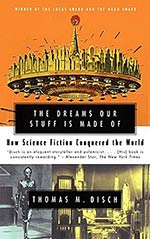
![]() davidpackwood1@gmail
davidpackwood1@gmail
7/6/2024
![]()
What an interesting conceit this book presents, namely that SF is a form of clever lies, predominantly targeted towards the neotenic personality. As Disch argues, Americans are more inclined to believe the Great Lie, wether it be UFOS, Atlantis, or Christian Science, and SF continues in that charlantanistic tradition. So, Disch identifies Edgar Allen Poe as the orginator of SF- within his terms- since he perpetrated hoaxes, or wrote about such pseudo-scientific topis as mesmerism. Unlike Aldiss wh argued that Mary Shelley's "Frankenstein" is the fons et origo of SF, Disch shuns this interpretation as purely theoretical: Shelley is an unread author, and for her gothic shocker to be part of SF, she must have a wider readership. In fact, Disch's investigation doesn't pursue the literary so much as the real facts, present in the history of hucksterism, fandom, Star Trek, the iconography of Sf - the rocket ship, the alien etc- all of which he places within a shrewd argument about Lies inc. Indeed, SF has plenty of this with L Ron Hubbard, the UFO- fanatics, and all the various claims made by notable individuals in the field. One of these is Dick- a personal friend of Disch- who the critic thought was spinning lies with his tales about Valis, and the alien intelligence makeover of the 1970s. Another author who occurs frequently in these pages is Heinlein who is posited as the head of the School of MilSF, the sign up/ship out branch of the genre. Heinlein and his comrades, namely Pournelle and the ones who followed him, were the public side of the military industrial complex. Heinlein, an advocate of SDI, fell out with Arthur C Clarke who presumably saw science as an instrument of human development, not war.
And another great thing about this book is that ponders the links between SF and popular culture within the post-war technological boom and political re-orientation after the 60s and 70s. "Star Trek" is seen as prodomic of the PC era with its multi-ethic cast; it's also seen as the blueprint for the office found in corporations and institutions. SF as lifestyle, in Disch's formulation. Ideas are wittily presented, and there's real humour when Disch says in a footnote that he offered the recipe of an aunt instead of a bad short story that Ursula Le Guin sought from him. Sadly, about a decade after this Disch would take his own life, but at least he left us this, which nicely supplements his own SF achievements.